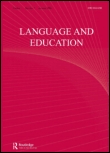
Language and Education
Scope & Guideline
Unveiling the Power of Language in Educational Contexts
Introduction
Aims and Scopes
- Multilingual Education Practices:
The journal explores various pedagogical approaches to multilingual education, including the integration of students' home languages in learning environments and the development of inclusive practices that support linguistic diversity. - Language Ideologies and Policies:
It critically examines the ideologies and policies that shape language instruction, including the impact of language policies on educational equity and access for marginalized communities. - Translanguaging and Multimodality:
The journal highlights translanguaging practices that allow learners to use their full linguistic repertoire, as well as the use of multimodal resources in language learning and teaching. - Teacher Education and Professional Development:
There is a strong focus on the preparation and ongoing development of teachers, particularly regarding their understanding of multilingual learners and culturally sustaining pedagogies. - Intercultural Communication and Identity:
The journal investigates how language education intersects with issues of identity, culture, and power dynamics within educational settings. - Research Methodologies in Language Education:
It employs a variety of research methodologies, including qualitative, quantitative, and mixed-methods approaches, to address complex issues in language education.
Trending and Emerging
- Translanguaging Practices:
The concept of translanguaging is increasingly featured, highlighting its role in allowing students to draw on their entire linguistic repertoire to enhance learning and participation. - Culturally Sustaining Pedagogies:
There is a growing emphasis on pedagogies that not only recognize but also leverage students' cultural backgrounds and experiences to enrich language learning. - Digital Literacy and Multimodal Composition:
Recent research explores the integration of digital tools and multimodal approaches in language education, addressing the need for learners to navigate diverse communication forms. - Social Justice in Language Education:
The journal is increasingly focused on social justice issues, examining how language education can address inequalities and promote equity for marginalized groups. - Critical Language Awareness:
A trend towards fostering critical language awareness among students and teachers is emerging, encouraging reflection on language use, power dynamics, and social identities. - Interdisciplinary Approaches:
There is a notable trend towards interdisciplinary research, combining insights from linguistics, education, sociology, and cultural studies to address complex language education issues.
Declining or Waning
- Traditional Language Teaching Methods:
There has been a noticeable decrease in papers focused on traditional, monolingual language teaching methods, as the field increasingly emphasizes multilingual and inclusive approaches. - Standardized Language Assessment:
Research centered on standardized assessments has diminished, possibly due to growing critiques of their effectiveness and fairness in evaluating diverse linguistic backgrounds. - Bilingual Education Models:
While bilingual education remains important, specific models that do not incorporate translanguaging or culturally responsive practices are becoming less prevalent in recent literature. - Language Acquisition Theories:
The focus on classical language acquisition theories without consideration of sociocultural factors appears to be waning, as contemporary research emphasizes more integrative and context-sensitive approaches. - Linguistic Competence as a Sole Focus:
There is a shift away from viewing linguistic competence in isolation, with more emphasis on functional and critical language use in context, reflecting changes in educational priorities.
Similar Journals
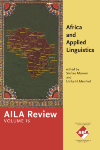
AILA Review
Advancing the frontiers of language research.AILA Review, published by John Benjamins Publishing Co, stands as a pivotal resource within the field of linguistics and language studies. With an ISSN of 1461-0213 and an E-ISSN of 1570-5595, this journal is dedicated to fostering innovative research and scholarship that advances the understanding of language in its diverse forms and applications. Spanning significant years from 2003 to 2016 and 2018 to 2024, AILA Review has established itself with a commendable reputation, reflected by its Q2 ranking in Linguistics and Language and notable Scopus rankings, positioning it in the 73rd percentile among Arts and Humanities. As an essential forum for researchers, professionals, and students alike, the journal invites high-quality contributions that engage with theoretical and practical aspects of language acquisition, multilingualism, and applied linguistics, enhancing discourse in these vital areas of study. Although not an open-access journal, its commitment to quality ensures that publications are widely recognized and cited, fostering impactful scholarly exchanges.
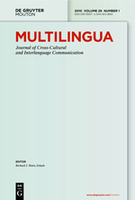
Multilingua-Journal of Cross-Cultural and Interlanguage Communication
Illuminating the Nuances of Interlanguage CommunicationMultilingua: Journal of Cross-Cultural and Interlanguage Communication is a premier academic journal published by DE GRUYTER MOUTON, specializing in the dynamic fields of communication and linguistics. Established in 1982, this journal has significantly contributed to the discourse surrounding multilingualism, intercultural interactions, and language acquisition, with a notable reputation backed by an impressive Q1 ranking in both Communication and Linguistics and Language for 2023. Positioned strategically at the heart of Germany, the journal serves as a vital platform for researchers, professionals, and students alike, fostering scholarly exchange and insights into cross-cultural communication practices. With rankings placing it in the top percentiles across key categories in Scopus, including Arts and Humanities and Social Sciences, Multilingua exemplifies the highest standards of academic excellence. Although currently not an Open Access journal, it continues to provide a wealth of knowledge to the global research community.
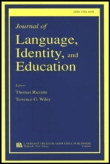
Journal of Language Identity and Education
Advancing Research at the Intersection of Language and EducationJournal of Language Identity and Education, published by Routledge Journals, Taylor & Francis Ltd, is a leading interdisciplinary journal that delves into the evolving intersections of language, identity, and educational practices. With a notable impact factor reflected by its positioning in the Q1 quartile in both Education and Linguistics & Language categories as of 2023, this journal is dedicated to publishing high-quality research that informs policy and practice within the fields of language education and identity formation. It enjoys a reputable standing in academic circles, highlighted by its impressive rankings in Scopus, where it is placed in the 96th percentile within the Arts and Humanities and Social Sciences categories. Scholars, educators, and students alike will benefit from the journal's rigorous scholarship and diverse perspectives. The journal actively contributes to the discourse on language as a fundamental component of identity, creating a vital platform for dialogue and research that resonates with educators and practitioners globally.

ALSIC-Apprentissage des Langues et Systems d Information et de Communication
Advancing Pedagogical Practices for a Global Audience.ALSIC-Apprentissage des Langues et Systems d Information et de Communication, published by ADALSIC, is a premier Open Access journal that has been at the forefront of language learning and information and communication systems since its inception in 1998. With its ISSN 1286-4986, this journal provides a crucial platform for researchers, educators, and practitioners to share innovative findings and pedagogical practices in the interdisciplinary fields of linguistics, education, and technology. The journal invites contributions that explore the dynamics of language acquisition, the effectiveness of communication systems, and the integration of technology in learning processes. By maintaining an Open Access policy, ALSIC ensures that its valuable research is accessible to a global audience, promoting collaboration and knowledge sharing among scholars and professionals dedicated to enhancing language education and communication methodologies. As an inclusive journal based in Strasbourg, France, it plays a vital role in shaping current discourse and advancing research in its field.
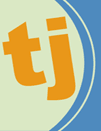
TESOL Journal
Illuminating Effective Teaching Practices in TESOLTESOL Journal, published by Wiley, is a premier academic journal dedicated to advancing the field of Teaching English to Speakers of Other Languages (TESOL). With an esteemed reputation reflected in its high impact factor and its Q1 ranking in both Education and Linguistics and Language categories for 2023, this journal serves as a critical resource for researchers, educators, and policy-makers. It covers a wide spectrum of topics related to language acquisition, pedagogical innovations, and educational strategies in TESOL, contributing significantly to the discourse around multilingualism and effective teaching practices. The journal is notable not only for its rigorous peer-review process but also for its commitment to disseminating high-quality research that informs and inspires practice in diverse educational settings. Interested readers can access articles through traditional subscription methods, ensuring that groundbreaking research is available to a broad audience. With converged years spanning from 2010 to 2024, TESOL Journal continues to evolve, making it a vital publication for anyone interested in the complexities of language education.
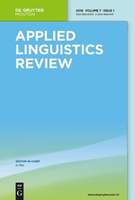
Applied Linguistics Review
Advancing the frontiers of language research.Applied Linguistics Review is a leading academic journal published by WALTER DE GRUYTER GMBH, focusing on the dynamic field of linguistics and language studies. With an impressive Q1 quartile ranking in both Linguistics and Language and Social Sciences, the journal positions itself at the forefront of research, making it a crucial resource for scholars and professionals alike. The journal aims to foster scholarly dialogue by publishing high-quality, peer-reviewed articles that explore theoretical frameworks, empirical studies, and innovative methodologies in applied linguistics. Operating from Poland with an international reach, it is committed to advancing knowledge in areas such as language acquisition, language policy, and multilingualism. Its notable performance can be seen in its Scopus rankings, where it stands at #72 out of 1088 in the Arts and Humanities category and #86 out of 1167 in Social Sciences. The Applied Linguistics Review serves as an invaluable platform for researchers, educators, and students to disseminate and engage with cutting-edge research, thereby enhancing their understanding and application of linguistic principles in diverse contexts.
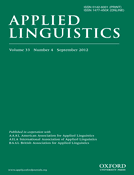
APPLIED LINGUISTICS
Exploring the Nexus of Language and SocietyApplied Linguistics, published by Oxford University Press, is a premier scholarly journal that has significantly contributed to the fields of linguistics and communication since its inception in 1980. With an impressive impact factor and ranked in the top quartile (Q1) in both Communication and Linguistics and Language categories, Applied Linguistics is recognized for its rigorous peer-reviewed articles that explore the intersections of language, society, and cognition. The journal enjoys a remarkable position in the Scopus rankings, placing it among the top 2% of publications in its discipline. Researchers, professionals, and students benefit from its comprehensive scope, which encompasses innovative research on language acquisition, discourse analysis, and applied linguistics methodologies. Although not an open access journal, its commitment to advancing knowledge and fostering academic discussions makes it an indispensable resource for anyone interested in the critical role of language in various contexts.
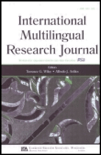
International Multilingual Research Journal
Championing rigorous research in education and linguistics.The International Multilingual Research Journal, published by Routledge Journals, Taylor & Francis Ltd, is a leading platform for the dissemination of innovative research in the fields of Education and Linguistics. With an impact factor reflecting its rigorous academic standards and a Q1 ranking in both relevant categories, this journal is dedicated to advancing the understanding of multilingualism and its implications globally. It serves as an essential resource for researchers, educators, and practitioners who seek to explore the complexities of language and learning across diverse cultural contexts. Since its inception in 2010, the journal has converged a wealth of scholarly articles that address contemporary issues in language use and pedagogical practices. The journal adheres to the highest research integrity standards and promotes open dialogue among scholars, making it a vital tool for those engaged in this expanding field. With its strong positioning in prestigious databases like Scopus, the International Multilingual Research Journal is committed to enriching the academic community and fostering interdisciplinary collaborations.

TESL Canada Journal
Advancing ESL Education Through Innovative ResearchTESL Canada Journal, published by TESL Canada, serves as a vital resource for researchers, educators, and practitioners in the field of English as a Second Language (ESL) and applied linguistics. With its commitment to advancing scholarship and best practices in language education, this esteemed journal fosters a platform for the dissemination of high-quality research and innovative pedagogical approaches. Although it operates without open access, its comprehensive articles and reviews offer valuable insights into current trends and challenges faced by ESL educators across Canada and internationally. The journal is dedicated to promoting a deeper understanding of language acquisition processes and instructional methodologies, contributing significantly to the professional development of its readership. Located in Burnaby, Canada, the journal aims to bridge the gap between theory and practice, making it an indispensable source for educators and researchers looking to enhance their expertise in ESL education.
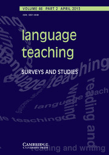
Language Teaching
Connecting researchers and practitioners in language teaching excellence.Language Teaching, published by Cambridge University Press, is a premier peer-reviewed journal that has been at the forefront of the linguistics and language education field since its inception in 1969. With an impressive impact factor positioning it in the top tier (Q1) of its category, this journal is ranked 22nd among 1,088 in the Arts and Humanities field and maintains an outstanding 98th percentile ranking. Focusing on innovative research and methodologies in language teaching and learning, Language Teaching provides a vital platform for discussing the latest developments in pedagogy, applied linguistics, and curriculum design. Although it does not offer open access options, it reaches a broad audience of researchers, educators, and practitioners dedicated to enhancing language instruction across various contexts. The journal continues to evolve, with plans to cover emerging trends and challenges in language education until 2024, making it an essential resource for anyone invested in the teaching of languages.